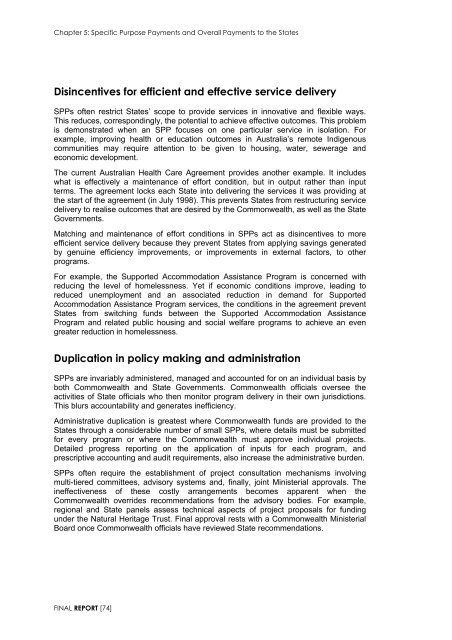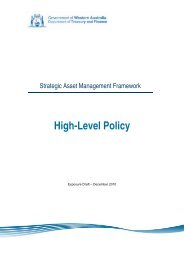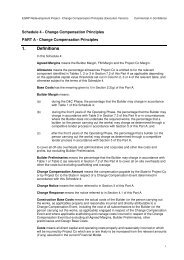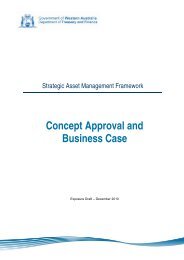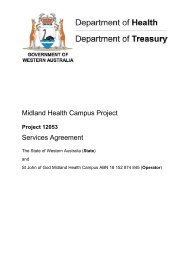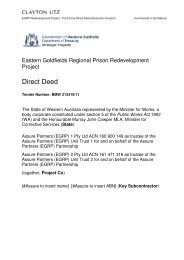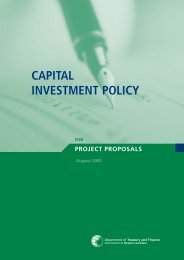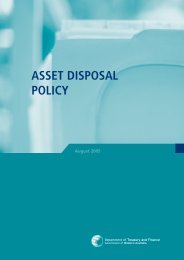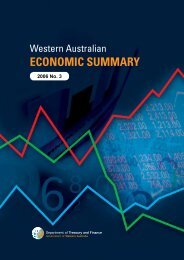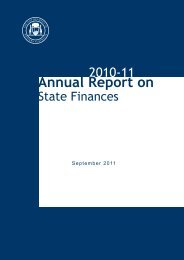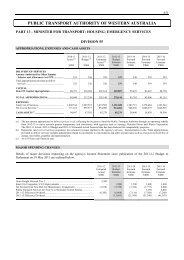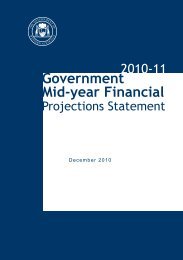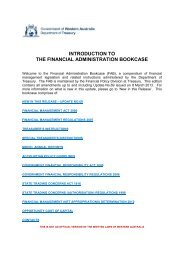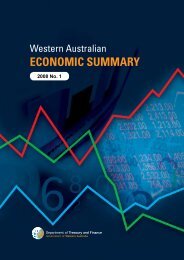Garnaut Fitzgerald Review of Commonwealth-State Funding
Garnaut Fitzgerald Review of Commonwealth-State Funding
Garnaut Fitzgerald Review of Commonwealth-State Funding
You also want an ePaper? Increase the reach of your titles
YUMPU automatically turns print PDFs into web optimized ePapers that Google loves.
Chapter 5: Specific Purpose Payments and Overall Payments to the <strong>State</strong>s<br />
Disincentives for efficient and effective service delivery<br />
SPPs <strong>of</strong>ten restrict <strong>State</strong>s’ scope to provide services in innovative and flexible ways.<br />
This reduces, correspondingly, the potential to achieve effective outcomes. This problem<br />
is demonstrated when an SPP focuses on one particular service in isolation. For<br />
example, improving health or education outcomes in Australia’s remote Indigenous<br />
communities may require attention to be given to housing, water, sewerage and<br />
economic development.<br />
The current Australian Health Care Agreement provides another example. It includes<br />
what is effectively a maintenance <strong>of</strong> effort condition, but in output rather than input<br />
terms. The agreement locks each <strong>State</strong> into delivering the services it was providing at<br />
the start <strong>of</strong> the agreement (in July 1998). This prevents <strong>State</strong>s from restructuring service<br />
delivery to realise outcomes that are desired by the <strong>Commonwealth</strong>, as well as the <strong>State</strong><br />
Governments.<br />
Matching and maintenance <strong>of</strong> effort conditions in SPPs act as disincentives to more<br />
efficient service delivery because they prevent <strong>State</strong>s from applying savings generated<br />
by genuine efficiency improvements, or improvements in external factors, to other<br />
programs.<br />
For example, the Supported Accommodation Assistance Program is concerned with<br />
reducing the level <strong>of</strong> homelessness. Yet if economic conditions improve, leading to<br />
reduced unemployment and an associated reduction in demand for Supported<br />
Accommodation Assistance Program services, the conditions in the agreement prevent<br />
<strong>State</strong>s from switching funds between the Supported Accommodation Assistance<br />
Program and related public housing and social welfare programs to achieve an even<br />
greater reduction in homelessness.<br />
Duplication in policy making and administration<br />
SPPs are invariably administered, managed and accounted for on an individual basis by<br />
both <strong>Commonwealth</strong> and <strong>State</strong> Governments. <strong>Commonwealth</strong> <strong>of</strong>ficials oversee the<br />
activities <strong>of</strong> <strong>State</strong> <strong>of</strong>ficials who then monitor program delivery in their own jurisdictions.<br />
This blurs accountability and generates inefficiency.<br />
Administrative duplication is greatest where <strong>Commonwealth</strong> funds are provided to the<br />
<strong>State</strong>s through a considerable number <strong>of</strong> small SPPs, where details must be submitted<br />
for every program or where the <strong>Commonwealth</strong> must approve individual projects.<br />
Detailed progress reporting on the application <strong>of</strong> inputs for each program, and<br />
prescriptive accounting and audit requirements, also increase the administrative burden.<br />
SPPs <strong>of</strong>ten require the establishment <strong>of</strong> project consultation mechanisms involving<br />
multi-tiered committees, advisory systems and, finally, joint Ministerial approvals. The<br />
ineffectiveness <strong>of</strong> these costly arrangements becomes apparent when the<br />
<strong>Commonwealth</strong> overrides recommendations from the advisory bodies. For example,<br />
regional and <strong>State</strong> panels assess technical aspects <strong>of</strong> project proposals for funding<br />
under the Natural Heritage Trust. Final approval rests with a <strong>Commonwealth</strong> Ministerial<br />
Board once <strong>Commonwealth</strong> <strong>of</strong>ficials have reviewed <strong>State</strong> recommendations.<br />
FINAL REPORT [74]


